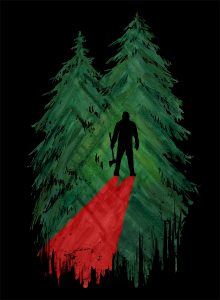An account by the Woodman, as provided by Richard Zwicker
Art by Leigh Legler
I am a woodman, by profession and constitution. I go into the darkness of the woods, choose large trees, and through the sweat of my arms and the sharpness of my axe, chop them into lengths that provide heat against the harsh winter. I am good at my job, which I attribute in part to my identification with trees. Though alive and a pillar of support to those that depend on them, trees possess a stolid, impenetrable quality and are surrounded by more complex creatures they can never understand.
My first wife was as beautiful as a new day. She was attracted to my rugged exterior and dependability. “I love the fact that you never surprise me,” she used to say. She was the personification of “happily ever after.” Much of life is unpredictable, however, and a mysterious illness struck her down. The country doctor called it something he could barely pronounce, which I think he made up on the spot. As the disease lurched to its final stages, my wife smiled, trembling, a bit twisted, but unmistakably in defiance. Her last words were, “There’s not always tomorrow.” She left me with two children, Hansel and Gretel, the ultimate optimistic act.
I had gotten this far in life by keeping my needs simple and met, but the loss of my spouse left me incomplete. When I wasn’t out chopping down trees, I tried to maintain my dead wife’s nurturing ways with my children. “Are you okay? How can I help? What would you like to do today?” These questions hung in the air like rainless clouds. Hansel and Gretel wanted answers, not questions, and that was beyond my expertise.
After I endured a suitable period of mourning, my neighbor, a shoemaker, said I should remarry. I thought that was funny, coming from someone whose wife had made nagging an art form. I asked him to explain his suggestion. “And please, don’t get all shoemaker on me. I’m just a simple woodman.”
“It’s not good to be alone,” he said.
“I have two kids.”
“Who have said barely a complete sentence between them since their mother died. We all have thoughts that need to be expressed. If we keep them inside, they devolve into nightmarish monologues. Before I got married, I wrote some of mine down. I could show them to you.”
“I’ll pass.”
“Solitary people think they can control these monologues, but they act as an illness, bending our spirit and pulling us in directions we should never go.” He noticed my eyes glazing over. “It’s like a tree choked off by vegetation, so instead of growing straight and true, it becomes gnarled and weird.”
That I could understand, though I thought it melodramatic. As time passed, other villagers added to the chorus of “You should marry a nice girl … soon.” I relented and quickly discovered that nearly everyone had a plain, unmarried friend with a great personality. None of them really jumped out at me though, and a few jumped away. Having been so lucky with my first marriage, I mistakenly considered myself a good judge of character. I ended up marrying a woman from outside the village. Her surface beauty masked a cruel and selfish soul. At first she pretended to be entranced by my biceps and to love Hansel and Gretel, but a drought brought out her true colors.
In our isolated village, everyone depended on the land. When the rain stopped and fields turned dry and brittle, choices had to be made. My patrons were forced to address their grumbling bellies, and then chopped their own wood. We suddenly had no means to feed ourselves. When we got down to our last loaf of bread, my second wife insisted we abandon our children in the forest, halving the number of mouths to feed. This seemed severe, and something my first wife would never have suggested.

The next few days, I scoured the forest. I don’t know if it was out of grief or because it was expected of me. The shoemaker offered to help, but he’d just had another apocalyptic argument with his wife, and I didn’t want to get too close. I also worried that if I found the children, my wife and I would be back in the same predicament.
To read the rest of this story, check out the Mad Scientist Journal: Winter 2017 collection.
The Woodman is a workaholic and single parent, in that order, who has trouble seeing the forest for the trees. Not to be confused with the woodman in “Snow White.”
Richard Zwicker is an English teacher living in Vermont, USA, with his wife and beagle. His short stories have appeared in Penumbra, Farstrider Magazine, Perihelion Science Fiction, and other semi-pro markets.
Leigh’s professional title is “illustrator,” but that’s just a nice word for “monster-maker,” in this case. More information about them can be found at http://leighlegler.carbonmade.com/.
“Wood Man” is © 2017 Richard Zwicker
Art accompanying story is © Leigh Legler
